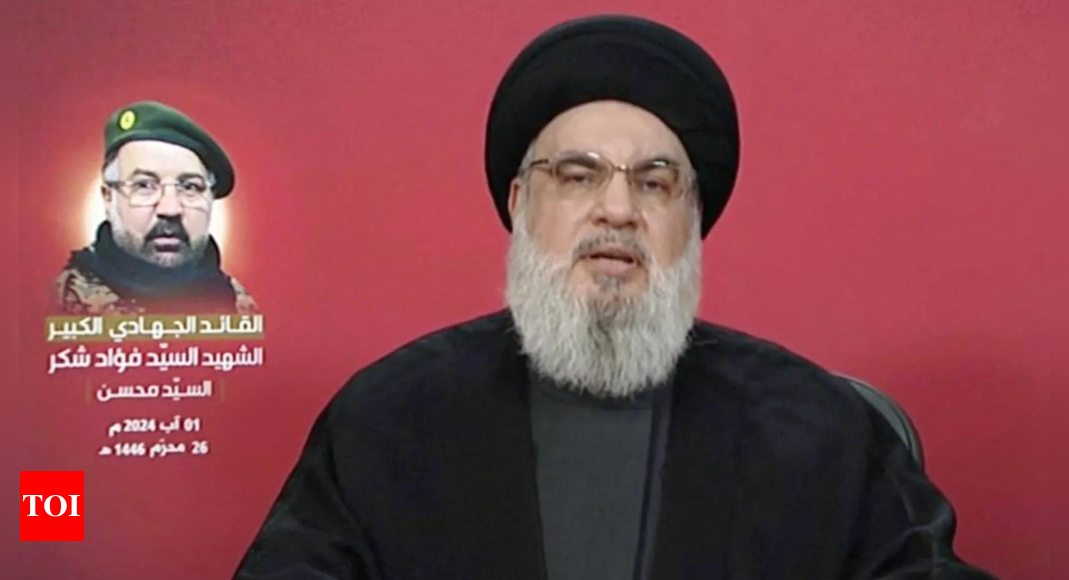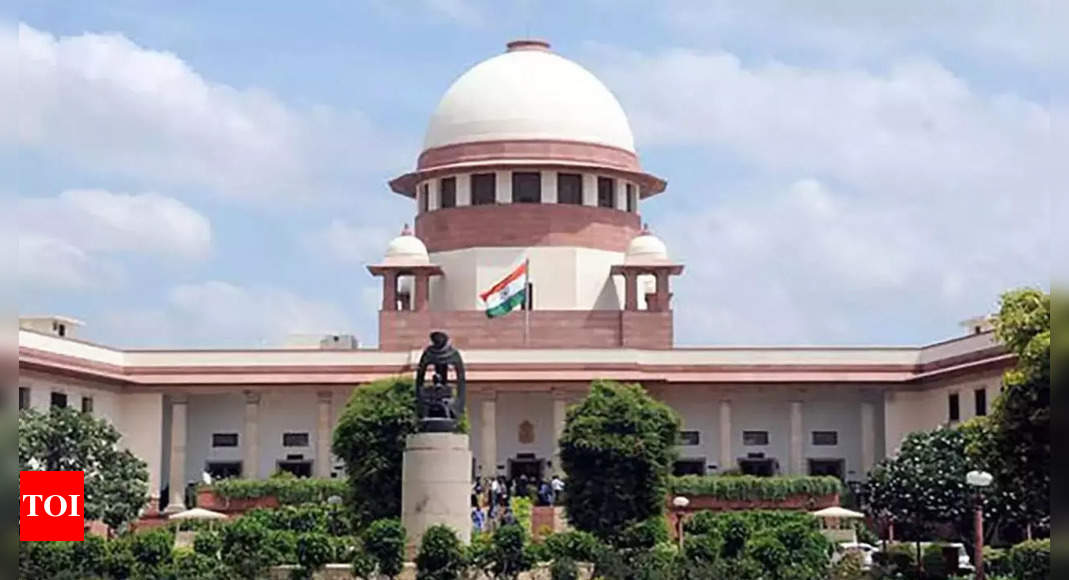
Hezbollah leader Hassan Nasrallah cautioned on Thursday that the struggle with Israel has entered a “new phase” while addressing mourners at the funeral of a commander from the group who was killed by an Israeli airstrike in Beirut earlier this week. Concurrently, Iran‘s supreme leader prayed over the body of Hamas‘ political leader in Tehran, who was killed in what is believed to be an Israeli assassination.
The consecutive killings have heightened concerns about an escalation into a broader conflict, leaving the region uncertain about how Iran and its ally Hezbollah will respond. Iran has pledged to retaliate against Israel for the strike that killed Hamas’ Ismail Haniyeh on Wednesday in Tehran, reported AP.
Israel has not claimed responsibility for Haniyeh’s assassination, but comments by Israeli military spokesman Rear Adm Daniel Hagari fell short of an outright denial.
“There was no additional airstrike, not a missile and not an Israeli drone, in the entire Middle East that night,” he said Thursday, fuelling speculation that Israel could have used other means to kill Haniyeh.
Israel confirmed that it carried out the strike on Tuesday in Beirut that killed Hezbollah commander Fouad Shukur, along with an Iranian military adviser and at least five civilians. Israel stated that Shukur was responsible for a rocket attack days earlier that hit a soccer field in the Israeli-held Golan Heights, killing 12 children. Hezbollah denied involvement in that strike, a denial that Nasrallah reiterated. “We have the courage to take responsibility for where we strike, even if it’s a mistake. If we made a mistake, we would admit and apologize,” Nasrallah said, adding, “The enemy made itself the judge, jury, and executioner without any evidence.”
In a video link speech to mourners gathered with Shukur’s coffin at an auditorium in a Beirut suburb, Hezbollah leader Hassan Nasrallah said, “We…have entered a new phase that is different from the previous period.” “Do they expect that Hajj Ismail Haniyeh will be killed in Iran and Iran will remain silent?” he said of the Israelis. Addressing Israelis who celebrated the two killings, he said, “Laugh a bit and you will cry a lot.”
Nasrallah kept his comments vague, promising a “very-well studied retaliation” without specifying what form it would take. He only said that Israel “will have to wait for the anger of the region’s honourable people.” “The enemy and the one who is behind the enemy” – an apparent reference to Israel’s chief ally, the United States – “will have to wait for our coming response,” he said.
Nasrallah also stated that Hezbollah’s fighters would also return to military operations Friday, ending the period of mourning for Shukur, but that the renewed strikes would be unrelated to the retaliation for his killin
Meanwhile, international officials have been working to prevent a cycle of retaliation before it escalates into a larger conflict. Since the Gaza war began in October, Hezbollah and Israel have exchanged fire almost daily across the border, resulting in deaths and the evacuation of tens of thousands from their homes. However, they have also remained within certain limits.
On several occasions, strikes that appeared to cross red lines raised concerns about an escalation into full-fledged war, but outside diplomacy managed to restrain both sides. Hezbollah faces significant pressure not to draw Lebanon into a repeat of the militant group’s 2006 war with Israel, which caused heavy death and destruction in the country.
Israel and Iran risked plunging into war earlier this year when Israel hit Iran’s embassy in Damascus in April. Iran retaliated, and Israel countered in an unprecedented exchange of strikes on each other’s soil, but international efforts succeeded in containing that cycle before it spun out of control.
Earlier Thursday in Tehran, Iranian supreme leader Ayatollah Ali Khamenei prayed over Haniyeh’s coffin in a ceremony at Tehran University, with the new president, Masoud Pezeshkian, next to him. State television later showed the coffin placed in a truck and moved on the street toward Azadi Square in Tehran and people throwing flowers at it.
Haniyeh’s remains are to be transferred to Qatar for burial Friday.
Haniyeh came to Tehran to attend the inauguration of Pezeshkian. Hours later, he was killed in a strike that hit a residence Haniyeh uses in Tehran. Iranian authorities said the attack is under investigation.
The consecutive killings have heightened concerns about an escalation into a broader conflict, leaving the region uncertain about how Iran and its ally Hezbollah will respond. Iran has pledged to retaliate against Israel for the strike that killed Hamas’ Ismail Haniyeh on Wednesday in Tehran, reported AP.
Israel has not claimed responsibility for Haniyeh’s assassination, but comments by Israeli military spokesman Rear Adm Daniel Hagari fell short of an outright denial.
“There was no additional airstrike, not a missile and not an Israeli drone, in the entire Middle East that night,” he said Thursday, fuelling speculation that Israel could have used other means to kill Haniyeh.
Israel confirmed that it carried out the strike on Tuesday in Beirut that killed Hezbollah commander Fouad Shukur, along with an Iranian military adviser and at least five civilians. Israel stated that Shukur was responsible for a rocket attack days earlier that hit a soccer field in the Israeli-held Golan Heights, killing 12 children. Hezbollah denied involvement in that strike, a denial that Nasrallah reiterated. “We have the courage to take responsibility for where we strike, even if it’s a mistake. If we made a mistake, we would admit and apologize,” Nasrallah said, adding, “The enemy made itself the judge, jury, and executioner without any evidence.”
In a video link speech to mourners gathered with Shukur’s coffin at an auditorium in a Beirut suburb, Hezbollah leader Hassan Nasrallah said, “We…have entered a new phase that is different from the previous period.” “Do they expect that Hajj Ismail Haniyeh will be killed in Iran and Iran will remain silent?” he said of the Israelis. Addressing Israelis who celebrated the two killings, he said, “Laugh a bit and you will cry a lot.”
Nasrallah kept his comments vague, promising a “very-well studied retaliation” without specifying what form it would take. He only said that Israel “will have to wait for the anger of the region’s honourable people.” “The enemy and the one who is behind the enemy” – an apparent reference to Israel’s chief ally, the United States – “will have to wait for our coming response,” he said.
Nasrallah also stated that Hezbollah’s fighters would also return to military operations Friday, ending the period of mourning for Shukur, but that the renewed strikes would be unrelated to the retaliation for his killin
Meanwhile, international officials have been working to prevent a cycle of retaliation before it escalates into a larger conflict. Since the Gaza war began in October, Hezbollah and Israel have exchanged fire almost daily across the border, resulting in deaths and the evacuation of tens of thousands from their homes. However, they have also remained within certain limits.
On several occasions, strikes that appeared to cross red lines raised concerns about an escalation into full-fledged war, but outside diplomacy managed to restrain both sides. Hezbollah faces significant pressure not to draw Lebanon into a repeat of the militant group’s 2006 war with Israel, which caused heavy death and destruction in the country.
Israel and Iran risked plunging into war earlier this year when Israel hit Iran’s embassy in Damascus in April. Iran retaliated, and Israel countered in an unprecedented exchange of strikes on each other’s soil, but international efforts succeeded in containing that cycle before it spun out of control.
Earlier Thursday in Tehran, Iranian supreme leader Ayatollah Ali Khamenei prayed over Haniyeh’s coffin in a ceremony at Tehran University, with the new president, Masoud Pezeshkian, next to him. State television later showed the coffin placed in a truck and moved on the street toward Azadi Square in Tehran and people throwing flowers at it.
Haniyeh’s remains are to be transferred to Qatar for burial Friday.
Haniyeh came to Tehran to attend the inauguration of Pezeshkian. Hours later, he was killed in a strike that hit a residence Haniyeh uses in Tehran. Iranian authorities said the attack is under investigation.









